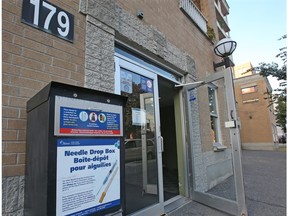Health
Ottawa Closes Supervised Consumption Service After Endorsement Denial

The supervised consumption service located at 179 Clarence Street in Ottawa has ceased operations following a lack of endorsement from the Ontario government. Ottawa Public Health (OPH) did not receive the necessary approval to continue the program from Sylvia Jones, Ontario’s Minister of Health. This closure reflects a significant shift in the city’s harm reduction efforts, which are vital in addressing the ongoing opioid crisis.
The service, which had been operating under a federal exemption that expired on September 30, 2023, was unable to secure a renewal due to changes in provincial regulations. Under the new Community Care and Recovery Act, the site required an endorsement from the Minister of Health to continue its operations, which was ultimately not granted.
Impact of the Closure on Community Health
Dr. Trevor Arnason, Ottawa’s medical officer of health, expressed disappointment regarding the closure in a memo to the city council. He highlighted the detrimental effects this decision could have on residents who rely on these critical services. “Harm reduction services save lives, reduce the spread of blood-borne infections, and provide safer spaces that help reduce public drug use,” Arnason stated.
Since its inception in 2017, the Clarence Street site has recorded nearly 33,000 visits. In the year 2024 alone, it facilitated 3,546 visits and responded to 27 non-fatal overdoses. The site also played a crucial role in connecting users to essential services, making over 2,000 referrals to mental health and substance use support services.
The closure of this site leaves just two remaining supervised consumption facilities in Ottawa: those at the Sandy Hill Community Health Centre and The Trailer 2.0 operated by the Shepherds of Good Hope. OPH continues to offer harm reduction services from 179 Clarence Street, including distribution of supplies and naloxone training, despite the loss of the supervised consumption service.
Future of Harm Reduction in Ottawa
Dr. Arnason assured the community that OPH’s mobile harm reduction van services would remain operational, running daily from 17:00 to 23:30. He emphasized that no staff would be laid off as a result of this closure, with resources being reallocated to support ongoing harm reduction efforts.
The supervised consumption service was recognized as a low-barrier entry point to the healthcare system, fostering trusted relationships with individuals who use drugs. “We will continue engaging with individuals in need, building trust and facilitating access to services to achieve long-term well-being,” Arnason pledged.
The decision to discontinue the service underscores the ongoing challenges faced by harm reduction initiatives in Canada. As the community grapples with the implications of this closure, health officials stress the importance of maintaining access to vital support services for those most affected by substance use.
-

 Science3 months ago
Science3 months agoToyoake City Proposes Daily Two-Hour Smartphone Use Limit
-

 Top Stories3 months ago
Top Stories3 months agoPedestrian Fatally Injured in Esquimalt Collision on August 14
-

 Health3 months ago
Health3 months agoB.C. Review Reveals Urgent Need for Rare-Disease Drug Reforms
-

 Technology3 months ago
Technology3 months agoDark Adventure Game “Bye Sweet Carole” Set for October Release
-

 World3 months ago
World3 months agoJimmy Lai’s Defense Challenges Charges Under National Security Law
-

 Lifestyle3 months ago
Lifestyle3 months agoVictoria’s Pop-Up Shop Shines Light on B.C.’s Wolf Cull
-

 Technology3 months ago
Technology3 months agoKonami Revives Iconic Metal Gear Solid Delta Ahead of Release
-

 Technology3 months ago
Technology3 months agoApple Expands Self-Service Repair Program to Canada
-

 Technology3 months ago
Technology3 months agoSnapmaker U1 Color 3D Printer Redefines Speed and Sustainability
-

 Technology3 months ago
Technology3 months agoAION Folding Knife: Redefining EDC Design with Premium Materials
-

 Technology3 months ago
Technology3 months agoSolve Today’s Wordle Challenge: Hints and Answer for August 19
-

 Business3 months ago
Business3 months agoGordon Murray Automotive Unveils S1 LM and Le Mans GTR at Monterey









